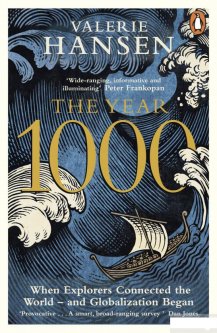The Year 1000: When Explorers Connected the World — and Globalization Began (1278368)
686.00 ₴
Лучшие условия покупки!
- Удовольствие гарантировано
- Беспроблемный возврат
- Безопасные платежи
An authoritative rethinking of global history by a leading Yale professor When did globalization begin? Most observers have settled on 1492, the year Columbus discovered America. But as celebrated Yale professor Valerie Hansen shows, it was the year 1000, when for the first time new trade routes linked the entire globe, so an object could in theory circumnavigate the world. This was the ‘big bang’ of globalization, which ushered in a new era of exploration and trade, and which paved the way for Europeans to dominate after Columbus reached America. Drawing on a wide range of new historical sources and cutting-edge archaeology, Hansen shows, for example, that the Maya began to trade with the native peoples of modern New Mexico from traces of theobromine — the chemical signature of chocolate — and that frozen textiles found in Greenland contain hairs from animals that could only have come from North America. Introducing players from Europe, the Islamic world, Asia, the Indian Ocean maritime world, the Pacific and the Mayan world who were connecting the major landmasses for the first time, this compelling revisionist argument shows how these encounters set the stage for the globalization that would dominate the world for centuries to come.
| Brand |
|---|



